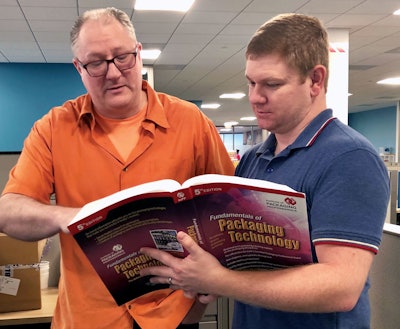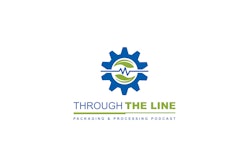Food and beverage giant PepsiCo is well underway on its ambitious training initiative intended to strengthen its ability to respond to 21st century packaging challenges. An initial group of 20 package developers within the multinational company’s global R&D group were selected by their leadership in 2018 to complete the Institute of Packaging Professionals’ Certified Packaging Professional (CPP) training program, and their success has led to an ongoing program.
Historically, some on the PepsiCo packaging team have completed their CPP requirements, but today the company’s internal training and development organization is looking to leverage external partnerships to further develop employees in a way that provides tangible value to training participants, beyond knowledge or skill development. The training partnership with IoPP provides employees an opportunity to strengthen their credentials and receive industry recognition as those who can provide leadership as broader subject matter experts.
Yolanda Malone, vice president, global R&D, partnered with the training group to begin the program in 2018. She anticipates PepsiCo’s program with IoPP will be ongoing, to the extent that CPP will become a common achievement within PepsiCo’s sizeable packaging department.
“PepsiCo values continuous learning for our associates as it maximizes shareholder value and builds a strong culture,” says PepsiCo’s Garry Kohl, describing the program as “transformational” for the company’s packaging teams. Kohl is senior director, R&D, Global Packaging Innovation—Snacks & Foods, and a chief organizer of the training program at PepsiCo. “The IoPP CPP program is renowned and considered one of the very best programs for learning after university training. PepsiCo is proud to have our associates achieve the Certified Packaging Professional credential. We offered the CPP program as voluntary, but our team jumped at the opportunity to participate due to the strength of the curriculum and the reputation of the program,” Kohl says.
“The CPP credential is globally recognized and the training is globally available—key elements for the vitality and sustainability of this program,” adds Victoria Smoak, PepsiCo senior manager in Learning and Development. “We are excited to offer a globally consistent, equally accessible curriculum to raise the bar on our talent capability across packaging.”
Coordination was key
The company approached IoPP several years ago to begin laying the groundwork for the program. There were several initial challenges. Chief among them was that the learners were spread far and wide, from seven countries around the globe, working in the United States, Mexico, Brazil, United Kingdom, India and China. In addition, Kohl and his leadership team had a goal of “graduating” everyone in a similar time period—no easy task to coordinate among busy package developers.
“We also identified early on that some within the group clearly didn’t need any training while others needed a fair amount, or needed to fill knowledge gaps, in order to be adequately prepared to take our certification exam,” says Jim George, IoPP director of education. “We needed to coordinate the learning opportunities around a variety of different time zones. Ultimately, we succeeded in customizing a multi-platform approach to meet PepsiCo’s needs.”
The program came together through diligent planning between IoPP, PepsiCo’s Learning and Development team, and the leaders in PepsiCo’s packaging organization. And through a lot of perseverance.
For its part, Kohl notes that the PepsiCo training group and their supervisors “held regular global virtual conferences to connect the teams, conduct live classes, and keep the momentum going.”
PepsiCo began by licensing IoPP’s Fundamentals of Packaging Technology online course and arranging an IoPP membership for each student (a requirement for IoPP certification). Some in the group needed to take the entire 41-module Fundamentals curriculum while others required only a few modules, George says.
All in the group of 20 who needed additional preparatory coursework completed their course modules by fall 2018. This coordination was important for moving on to the next step, George says, because it brought each learner up to the same level of packaging knowledge.
Next, in November and December 2018, IoPP coordinated with PepsiCo to schedule teleconference sessions in which IoPP certified Fundamentals instructors reviewed with the learners important points in the course content. The learners were divided into smaller groups based in part on time zones, each with its own schedule of review sessions.
Throughout the process, IoPP tracked each learner’s progress and reported it back to the PepsiCo management team.
After completing the review sessions, the first candidates within the group began the certification process in January 2019. This requires passing an extensive online exam testing knowledge proficiency in each major area of packaging, as well as completing a résumé of activities that included documenting their achievements in packaging, such as earning patents, writing professional articles, or presenting as subject matter experts at conferences.
“Not everyone passes the exam, at least not on the first try, often because they think their past experiences alone in packaging will carry them easily through certification. But this group at PepsiCo didn’t take anything for granted, and they did well,” George says. “We noted in particular that their writing skills tested strongly, and they demonstrated a significant grasp of critical subject areas.”
Benefits for PepsiCo
The certification initiative fits the big picture at PepsiCo, which operates in more than 200 countries, and currently has associates in a dozen countries IoPP-certified across its food and beverage businesses. The training program has elevated the caliber of each certified team member, giving them greater flexibility and depth of technical knowledge, while also “providing our associates with a common education and similar terminology, which will benefit our mission over the long term,” Kohl observes.
As one example, their newfound packaging skills could come in handy as PepsiCo responds to ever-changing market details and executes initiatives such as its 2025 “Sustainability Agenda,” as outlined in a recent IoPP webinar, to support the development of a circular economy in which plastics never become waste. Specifically, PepsiCo’s packaging goals are to make all its packaging recyclable, biodegradable, or compostable by 2025, as well as reduce its carbon footprint by 20% by 2030.
On an individual basis, certification is having an excellent return on investment for those who have completed the program. The training required those in the group to fit education around their work schedules, but was well worth the effort, according to one of the newly certified PepsiCo professionals.
“Although I’ve worked in the packaging industry for over 30 years and am proficient in a number of disciplines, I’m happy I took the time to study all 41 modules,” says Steven Tucker, CPP, PepsiCo associate principle engineer. “I learned something from each and every one. That new insight paid immediate dividends on two projects I was working on at the time, resulting in improved factory efficiencies and, ultimately, a better consumer experience.”
IoPP’s George notes that it took many meetings and phone calls to iron out the details of such an ambitious training program on a global scale. The keys to success were having a clear overall plan and the PepsiCo team’s ability to have very organized communication among multiple offices to sort out the many steps required to make the program work globally. At times, that meant bringing multiple managers into planning calls from both the U.S. and the U.K.
“It starts with a champion from within an organization, especially of PepsiCo’s size, to truly have that vision for the desired outcomes for their team. With a clear initial vision, good planning usually follows from there,” George explains. “In this case, all the effort was well worth it. We’ve seen many cases in the past where companies have put groups through our training and certification, and the rewards include the flexibility to confidently reassign packaging team members from one brand to another as market conditions change. I say confidently because managers will know their team members can do the job because they all learned the same information the same way. I have no doubt the same could occur at PepsiCo.”
PepsiCo’s program with IoPP is now more than one year old, and Kohl anticipates the initial group will be the first of many to go through the program and become certified. “There is general excitement about the program,” he says. “Many of the new CPPs are saying that the course work helped them with a deeper technical understanding of many things that they just had base knowledge of previously. Additionally, they learned of newer technologies in which they had no experience.
“We plan to continue to offer the program for the next several years. We will never make it a formal requirement, but we estimate that more than half of our packaging community will have the certification at some point in the future,” Kohl adds.
What’s the lesson for success in training your employees? Perseverance is key. “It is very easy for associates to focus on their ‘day job’ and let training drop off their priorities. So it is important to keep positive energy and give them a little nudge,” Kohl says. “I really think (CPP) is a valuable program, and many corporations will adopt our transformational practice because it sets an industry standard for performance.”






















